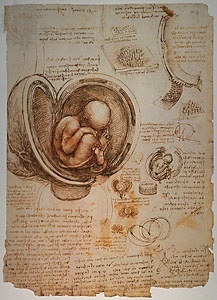fetus
embryology
also spelled foetus
 the unborn young of any vertebrate animal, particularly of a mammal, after it has attained the basic form and structure typical of its kind.
the unborn young of any vertebrate animal, particularly of a mammal, after it has attained the basic form and structure typical of its kind.A brief treatment of the fetus follows. For more information on the human fetus, see pregnancy.
Biologists arbitrarily speak of the earliest stages of development of the fertilized egg as the embryonic (embryo) period, which ends when the external form of the embryo begins to resemble clearly the newborn of the group to which it belongs. The next period, culminating in birth, is the fetal period. In human development this transition occurs in approximately the eighth week after conception. The fetal stage is characterized by increased growth and by the full development of the organ systems.
Some fetal disorders may cause birth of the infant before term. If spontaneous expulsion occurs before the human fetus has reached a stage of development advanced enough to allow it to live outside the womb (20 to 22 weeks), it is spoken of as an abortion or, commonly, a miscarriage. Expulsion of a dead fetus thereafter is considered a stillbirth and of a living fetus a premature birth (premature birth and postmature birth). Postmature birth is one occurring more than three weeks beyond the expected date of delivery.
- Battle of the Coral Sea
- Battle of the Ditch
- Battle of the Dunes
- Battle of the First of June
- Battle of the Golden Spurs
- Battle of the Granicus
- Battle of the Hydaspes
- Battle of the Little Bighorn
- Battle of the Maritsa River
- Battle of the Monitor and Merrimack
- Battle of the Monongahela
- Battle of the Neva
- Battle of the Nile
- Battle of the Philippine Sea
- Battle of the Pyramids
- Battle of the Saintes
- Battle of the Teutoburg Forest
- Battle of the Thames
- Battle of the Thirty
- Battle of the Three Kings
- Battle of the Ugra
- Battle of the Vorskla River
- Battle of the Wilderness
- Battle of Tippecanoe
- Battle of Tours